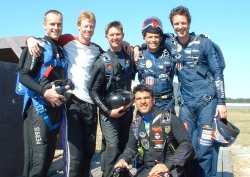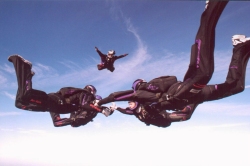
National
Skydiving
League
226 Pecan Street
Deland FL 32724
tel: (386) 801-0804
© 2003 - 2026
All Rights Reserved


226 Pecan Street
Deland FL 32724
tel: (386) 801-0804
© 2003 - 2026
All Rights Reserved


Skydiving team vying for U.S. three-peat
DELAND -- Free falling 10,000 feet at 120 mph while holding onto arms and legs, as your team tries to make as many figures as it can in 35 seconds, is the life of a professional skydiver.
There are few teams in the world that do it better than the DeLand Majik. In fact, no team in the last two years has been better in the four-way Open Division.

Information on dates and times can be found at the United States Parachute Association Web site, www.uspa.org.
So what has taken this group to the top of the skydiving world?
They believe there are 10 characteristics that drive their success: vision, inspiration, motivation, dedication, perseverance, courage, risk, focus, intensity and attitude.

The Majik spend their practice time on both the ground and in the air.
Ground work includes working on in-flight maneuvers using creepers inside the Skydive DeLand building. The team then takes its ground work and executes during their free falls.
They formed in 2001 and captured their first U.S. championship in 2003 with Park, Solly Williams, Joey Jones, Gary Smith and videographer Graham Harding.

"The team split when Gary left to spend more time with his family and concentrate on coaching. Joey felt like he needed a break from top-level training," said Williams, the team captain.
The Majik won their first world title in Croatia in 2003, then successfully defended it earlier this summer in Germany. In order to have a shot at a three-peat, the Majik will have to win again in the U.S. competition.
One important player will be Silva. With advances in technology, mid-air formations are now filmed by a videographer who jumps and films from above the formation with a camera strapped to his head. A cameraman out of place can lose points, and ultimately a championship, for a team.

While they're experts in their field, the Majik members don't mind sharing their knowledge. Almost all serve as skydiving coaches, often to their competition. (Imagine the Boston Red Sox going to New York during the off-season to help the Yankees work on their hitting.)

For those wanting to get into skydiving, novices at Skydive DeLand can start with a tandem jump where a first-time jumper is harnessed to his instructor.
"Most people don't come into the sport for sport, they come for the free fall," Williams said. "Those that worry about the danger only have to trust the equipment and the person they are jumping with."
A sport once considered solely for men, the number of women in the sport grows every day, said team members. Competition at the highest level now includes divisions for women.

Solly Williams: "A commitment to being fit and focused. This can often mean working through physical pains or dealing with adverse temperatures when training. It can also mean dealing with each other's differences on a day-to-day basis and staying focused on the goal. Putting the team ahead of the individual is crucial to success. You have to be born with the gene to explore and adventure. I often question myself as to what makes me different."

David van Greuningen: "I started skydiving while a student at Georgia Tech. The school has one of the largest parachute clubs in the country and a friend of mine from high school had started jumping there a couple of years before me. By the time he took me out for my first jump, I had already watched a lot of four-way video and was well on my way to knowing how to pack a parachute. I jumped there throughout college and moved to DeLand after graduation."

Doug Park: "Generally I would spend about one to two hours a day working out, running, cycling or some form of aerobic activity. This year has been a hard year for me. I have had a long term knee issue that has finally gotten worked on. That meant no training for about two months. I would also spend a few hours a day doing a mental workout. I will go through the engineering of the dives that we have done or the areas that I have problems with."